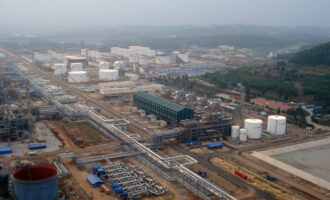
Australia strengthens fuel security by leasing space in U.S. SPR
The United States and Australia have signed a milestone arrangement that lays the groundwork for Australia to lease space in the U.S. Strategic Petroleum Reserve (SPR) to store and access Australian owned oil, strengthening international energy security and resiliency.
The arrangement will allow Australia to access Australian crude oil that is held in the U.S. Strategic Petroleum Reserve (SPR) during an emergency, once a decision is made by the Government of Australia to purchase the oil and lease space in the reserve. The arrangement stems from discussions between U.S. President Donald J. Trump and Australian Prime Minister Scott Morrison in Washington last August.
U.S. Secretary of Energy Dan Brouillette and Australia’s Energy and Emissions Reduction Minister Angus Taylor signed the new arrangement on 10 March 2020 at the U.S. DOE Headquarters in Washington, D.C.
“The U.S. Strategic Petroleum Reserve is a critical asset for energy and national security that America has had at our disposal for decades. There is no more secure or resilient place to store emergency oil reserves than the SPR, and we are glad that Australia is choosing to entrust us with their reserves,” said Brouillette. “This arrangement with Australia will strengthen the energy reliability of one of our strongest allies, providing them options in case of an emergency, and bolstering their energy security.”
“This landmark Australia-U.S. Arrangement represents our joint commitment to maintaining fuel security and improving Australia’s resilience, as well as strengthening the close bonds between our two great nations,” said Taylor. “The Strategic Petroleum Reserve is the world’s biggest emergency stockpile of oil. The U.S. is a trusted ally who has been essential for global oil security and we are glad to be building on our strong, long standing relationship, while ensuring Australia is best prepared to act during a global oil disruption.”
Under the arrangement, Australian Government owned stocks held in the Strategic Petroleum Reserve can be counted towards Australia’s compliance obligations with the International Energy Agency (IEA).
Under IEA obligations, Australia and other member countries are required to hold oil reserves equal to 90 days of the previous year’s net imports and are permitted to hold these reserves offshore where a bilateral arrangement is in place.
A separate leasing agreement is currently being negotiated between Australia and the U.S. This would detail the storage and delivery terms for any future purchases of oil Australia could make now that the arrangement is in place.
Australian car and truck drivers criticised the flagged deal with the U.S. They said any emergency supplies needed to be in Australia.
“It would not provide security for the Australian economy if there is a disruption to international supply chains,” the chairman of the Australian Trucking Association, Geoff Crouch, said last year. At the time Taylor said emergency supplies would take up to 40 days to reach Australia from the U.S.
Australia should dramatically decrease its oil use to ward off a potential crisis by tightening fuel-efficiency standards, introducing electric vehicle targets and increasing public transport use, the Australia Institute opined.
In a submission to a government review of the country’s liquid fuel security, researcher Tom Swann has called for stricter fuel efficiency standards for all imported cars and an urgent uptake of electric vehicles.
About 90% of Australia’s fuel supply is imported and the government has no stockpile of its own oil.
If all domestically produced oil was refined and used in Australia, this would meet about 25% of demand, according to the government’s draft report on fuel security, released in April 2019.
Australia’s refinery capacity is in decline. Port Stanvac refinery in Adelaide was mothballed in 2003, the Clyde refinery in New South Wales shut down in 2012, followed by Sydney’s Kurnell refinery in 2014 and the Bulwer Island refinery near Brisbane in 2015.
“New Australian refineries are uneconomical due to competition with Asian mega- refineries,” the institute says.
The consequences of not shoring up Australia’s fuel stocks could be dire for the economy and food production, as well as presenting a strategic risk, the institute says.









